Have you ever wondered if there’s a gentler, safer alternative to pressure washing that still leaves your surfaces sparkling clean? Unlock the science and secrets of soft washing and why more homeowners are making the switch.
Understanding What Is Soft Washing: The Safe Cleaning Revolution
- The essentials of what is soft washing
- How soft washing differs from pressure washing and power washing
- What surfaces benefit most from soft wash methods
- Safety and environmental impacts of cleaning solutions
- Tips for choosing professional soft washing services
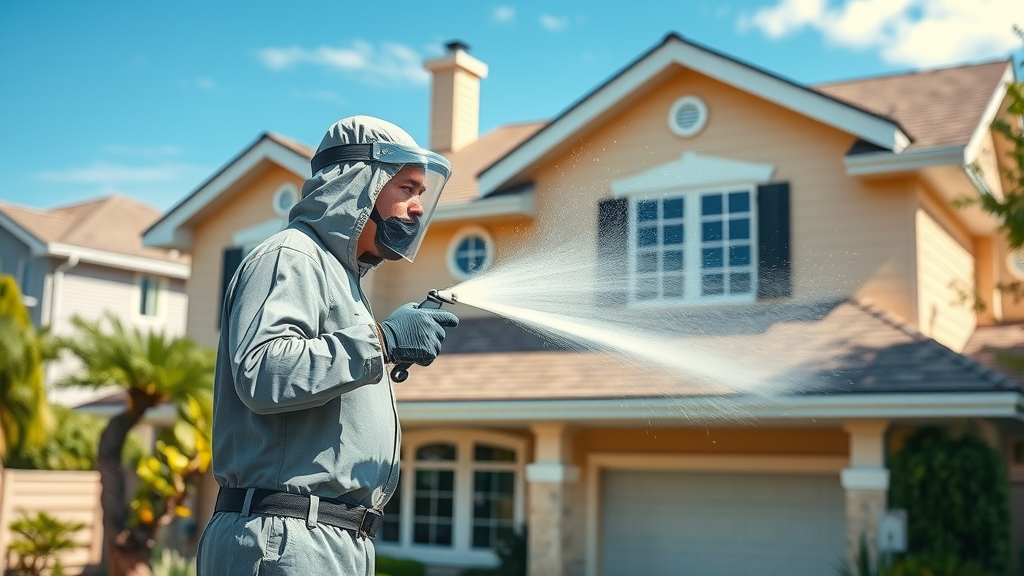
Are you searching for a safe, effective cleaning method for your home’s exterior? The rise of soft washing has transformed how we refresh our houses, roofs, and delicate surfaces. Rather than risking damage with traditional pressure washing or power washing , people are turning to this low-impact solution. Throughout this guide, you’ll discover what is soft washing, how it works, the science behind its eco-friendly cleaning solutions, and expert tips for choosing the right approach to clean your home .
Soft washing is much more than just spraying water. It harnesses a powerful yet gentle combination of low-pressure water and specially formulated, biodegradable cleaning solutions. The process eliminates mold, algae, mildew , and dirt—all while keeping your surfaces safe and undamaged. This makes soft washing the method of choice for roofs, siding, decks, and any area of your property sensitive to high pressure. Let’s dive into everything you need to know about this innovative cleaning revolution.
Defining What Is Soft Washing and How It Works
Soft Wash Explained: What Makes It Unique?
Soft washing is a cleaning method that uses low pressure (much lower than a pressure wash) combined with targeted biodegradable cleaning solutions to break down dirt, kill bacteria, and remove mold from your home’s exterior surfaces . Unlike a standard power wash or pressure washing system that relies on the sheer force of water to clean exterior walls, walkways, or driveways, soft washing focuses on leveraging chemistry to break down contaminants. The gentle approach is safer for delicate materials like roof shingles, painted siding, wood decks, and even older bricks.
This method involves applying a specifically formulated chemical mix—usually including sodium hypochlorite for its disinfecting properties and surfactants for deep cleaning—using a specialized wash system. The soft wash mixture safely penetrates porous surfaces, dissolving stubborn grime and organic growth. Crucially, the process uses only enough water pressure to rinse away residues, minimizing the risk of surface damage. That means your clean exterior looks fresh and vibrant, all while safeguarding your property’s value for the long run.
If you're interested in how these cleaning methods apply to specific areas around your property, such as walkways and driveways, you might find it helpful to explore practical sidewalk cleaning strategies. For a detailed look at effective techniques and maintenance tips, check out this comprehensive guide to sidewalk cleaning in Eugene, OR .
Comparison: What Is Soft Washing vs. Pressure Wash and Power Wash
Homeowners often want to understand the difference between a soft wash , standard pressure washing , and power washing . While all three aim to clean exterior surfaces , their approaches, equipment, and suitable applications differ dramatically.
A traditional pressure washer pumps out water at very high pressure (1,300 PSI and above), effectively blasting away grime from especially hard surfaces like concrete or brick. Power wash methods are similar but introduce heated water for extra cleaning muscle, ideal for tough industrial stains. In contrast, soft washing uses far lower water pressure (typically under 500 PSI) and allows eco-friendly cleaning solutions to do the heavy lifting. This ensures that fragile areas—such as roof shingles, painted siding or wooden patios—remain intact and undamaged by harsh jets of water.
| Method | Water Pressure | Cleaning Solution Used | Best For |
|---|---|---|---|
| Soft Washing | Low | Biodegradable cleaning solutions | Roofs, siding, delicate surfaces |
| Pressure Washing | High | Water (sometimes detergent) | Driveways, concrete |
| Power Washing | High + Heat | Water (sometimes detergent) | Industrial, stubborn dirt |
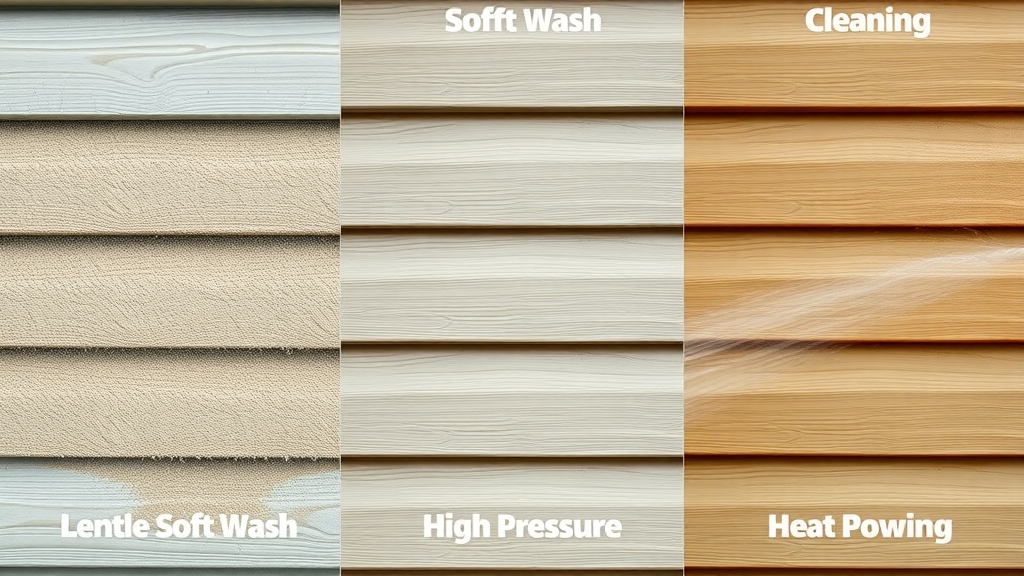
Soft Wash and Cleaning Solutions: Science and Safety
The Role of Cleaning Solutions in Soft Washing
What sets soft washing apart is the science of its cleaning solutions . Instead of brute force, the soft wash system relies on custom chemical mixes that effectively break down organic build-up, algae, and stains at their source. The most common cleaning solution ingredients include sodium hypochlorite (the active ingredient in household bleach), surfactants that help solutions stick to vertical surfaces, and water to dilute and rinse everything clean.
The inclusion of these cleaning solutions does more than just wash away surface grime. They actively neutralize the roots of mold, moss, and algae, making soft washing an excellent option for surfaces plagued by unsightly or damaging organic growth. Importantly, since the method applies low water pressure, it avoids damaging wood grains, roof shingles, or painted finishes. As a result, soft wash techniques prolong the life and curb appeal of your home's exterior.
Eco-Friendly Cleaning Solution Choices
Environmentally conscious homeowners increasingly prefer soft wash because of its commitment to sustainability. Many soft washing professionals choose biodegradable cleaning solutions that break down rapidly, preventing harmful runoff into groundwater or gardens. Today's best practice is to use blends that are EPA-approved, phosphate-free, and formulated for minimal impact on plant life or pets.
Leading providers take care with every step—using only as much solution as is necessary for a thorough clean, closely following manufacturer guidelines for dilution, and thoroughly rinsing treated areas. Adopting eco-friendly cleaning solutions ensures you get superior cleaning results and peace of mind, knowing your family and landscaping are safe from harsh chemicals.
“Using carefully selected, biodegradable cleaning solutions ensures what is soft washing is both effective and safe for your home and the environment.”
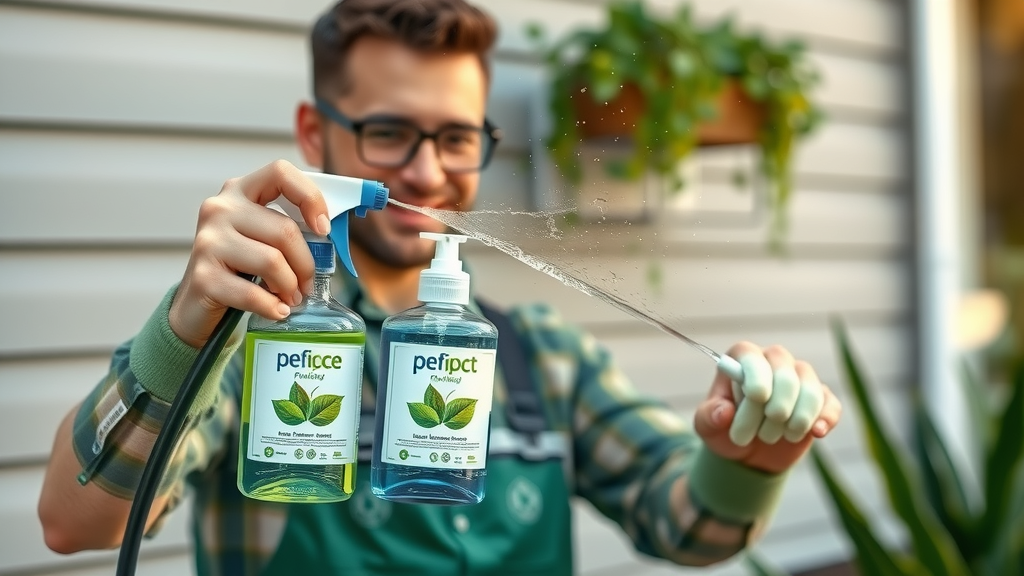
Soft Washing vs. Pressure Washing: Pros, Cons, and Practical Uses
- Gentle on surfaces
- Longer-lasting results
- Reduced risk of damage
- Effective at removing algae and mold
- Ideal for roofs, siding, and delicate areas
One of the key benefits of soft washing is its gentle approach. Low pressure and eco-conscious cleaning solutions protect vulnerable surfaces such as composite siding, wood trim, and roof shingles. Soft washing excels at removing mold , black or green algae, and even tough lichen, which are notoriously resistant to conventional pressure washing. Homeowners also appreciate the longer-lasting results, as soft washing treats the root source of stains instead of just brushing away the top layer.
When compared to high-pressure cleaning methods, soft wash stands out for its ability to preserve paint, caulk, and seals, limiting the chance of water intrusion or costly repairs. On the practical side, it’s the recommended method for delicate home features—decorative stone, vinyl accents, screens, or stucco. For harder, less sensitive surfaces like driveways or warehouse floors, traditional pressure washing may still be the better fit.
Potential Downsides and Myths: Is Soft Washing Always the Answer?
While the soft wash system is incredibly versatile, it is not the right answer for every cleaning job. There’s a persistent myth that soft washing works for all grime and stains, but certain heavy-duty situations—like thick oil stains or graffiti on concrete—are better suited to power wash or pressure wash techniques. High-pressure systems can rapidly strip away these tough residues that soft washing’s chemical reliance may not address.
Another misconception is that soft washing is always safer simply due to its low water pressure. While it does reduce the risk of property damage, using inappropriate cleaning solutions or failing to rinse thoroughly could potentially harm plants or finishes. Following professional soft washing best practices and using only approved chemical blends eliminates these risks, ensuring that this cleaning method lives up to its reputation for safety and effectiveness.
How Does Soft Washing Work? Process and Equipment
Step-by-Step: What Is Soft Washing Done Properly
- Inspection and surface prep
- Application of eco-friendly cleaning solution
- Low-pressure rinse
- Post-clean review and safety check
The soft washing process starts with a thorough inspection and preparation of the target surface area . Professionals identify the type of material (e.g., roofing, siding, wood deck) and pre-wet nearby foliage to protect landscaping. Next, technicians apply a custom cleaning solution —tailored for the type of staining involved—using specialized nozzles or sprayers that deliver a safe, even coating.
After a dwell period, allowing the solution to break down mold, algae, and residue, the area is gently rinsed with low-pressure water. This method ensures that contaminants are completely washed away without high-pressure blasting. The final step is a post-clean review to ensure all contaminants are removed, and sensitive areas (such as plants or painted finishes) remain unharmed. Done correctly, this cleaning method leaves your surfaces spotless and extends their usable life.
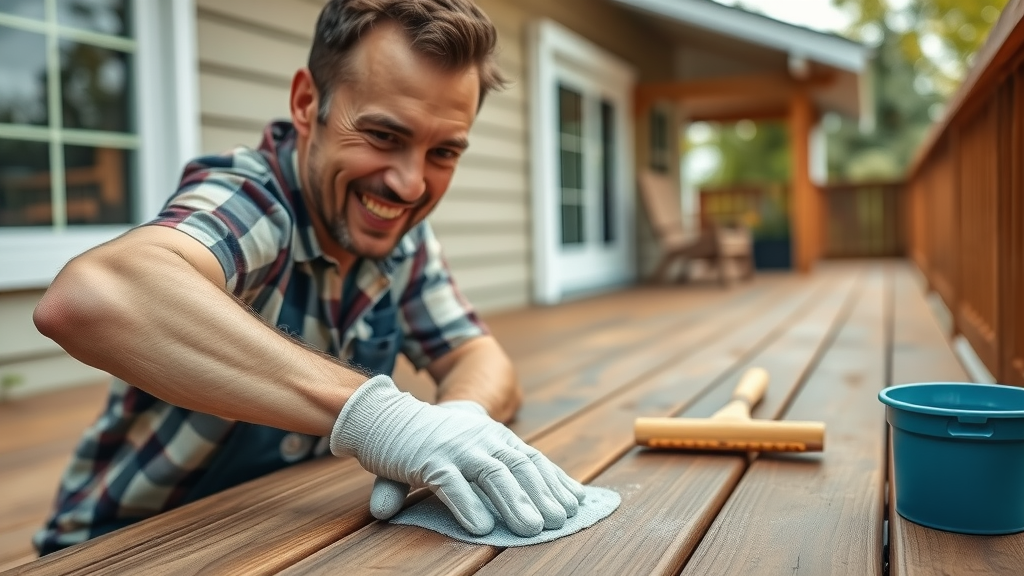
What Chemicals to Use for Soft Washing?
Safe and Approved Soft Washing Solutions
Selecting the right chemicals is crucial for a successful soft wash . The top choice is typically sodium hypochlorite, noted for its mold- and algae-killing properties, paired with biodegradable surfactants. Surfactants help the solution cling to vertical surfaces, ensuring comprehensive coverage. Trusted professional soft washing brands rely only on products approved by regulatory authorities and designed for residential or commercial outdoor use.
These compassionate cleaning solutions minimize harm to the surrounding environment, pets, and people. Modern industry standards increasingly favor hydrogen peroxide blends, quaternary ammonium compounds, and plant-based detergents for their environmental safety and residual cleaning effectiveness. Always check labeling and safety data—never use harsh acids or chemicals not specifically intended for soft washing.
Best Practices for Handling Cleaning Solutions
When using any cleaning solution , safety and precision are essential. Start by following the product’s label instructions for appropriate dilution and protective gear, including gloves and eyewear. Only mix chemical solutions outdoors or in well-ventilated spaces. Apply the blend strictly to the intended surface you are cleaning , keeping children and pets at a safe distance during use.
Rinse treated areas thoroughly with fresh, clean water to remove any potential residues. If using a commercial service, always look for a professional soft washing company with well-trained staff and clear safety protocols. Responsible handling preserves your surfaces, the environment, and family health.
Is It Better to Pressure Wash or Soft Wash a House?
Factors Affecting Your Cleaning Method Choice
Deciding between pressure washing and soft washing your house depends on several factors: the surface material, presence of organic growth, level of staining, and your desire for eco-friendly results. Soft washing is ideal for more delicate surfaces—like asphalt roof shingles, vinyl or painted siding, stucco, and decks—whereas pressure wash fits best for tough, non-porous surfaces such as concrete driveways, stone pavers, or brick walls.
If your main concern is organic matter (mold, algae, mildew), soft washing’s use of proven cleaning solutions ensures thorough root removal and longer-lasting cleanliness. For large, flat surfaces caked with mud, dirt, and inorganic debris, the high force of a pressure washer will save time and effort. The surfaces you’re treating—and your commitment to safety and curb appeal—will guide your best choice.
Expert Insights: Soft Washing for Different Materials
Soft washing is a safe and versatile cleaning method for a wide range of exterior surfaces. Roofing materials (especially composite and shingle roofs), painted or treated wood, vinyl, and even outdoor furniture all benefit from gentle cleaning. Experts recommend checking manufacturer guidelines for your siding or roofing to determine which method for cleaning is optimal.
For historic homes, soft washing preserves the integrity of older surfaces where high-pressure water to clean exterior surfaces can weaken mortar joints or dislodge tiles. On the other hand, newer builds with durable masonry may tolerate power washing or pressure washing without harm, but the chemical approach of soft washing will still offer a superior, longer-lasting clean for any organic build-up.
Can You Soft Wash with Any Pressure Washer?
Adapting Equipment for Safe Soft Washing
While it’s tempting to use a standard pressure washer for soft washing, not every model is suitable. True soft wash systems employ low-pressure pumps and specialized delivery mechanisms to distribute cleaning solutions gently and evenly, never exceeding safe PSI limits for delicate surfaces. You may be able to adapt some pressure washers by switching to wide-angle nozzles and lowering output, but this often lacks the fine control and even distribution a real soft washing rig provides.
When in doubt, consult your equipment manual or contact a professional. Modern soft washing equipment not only allows precise control over water pressure, but also includes tanks for properly storing chemical solutions and downstream injectors for safe, measured application.
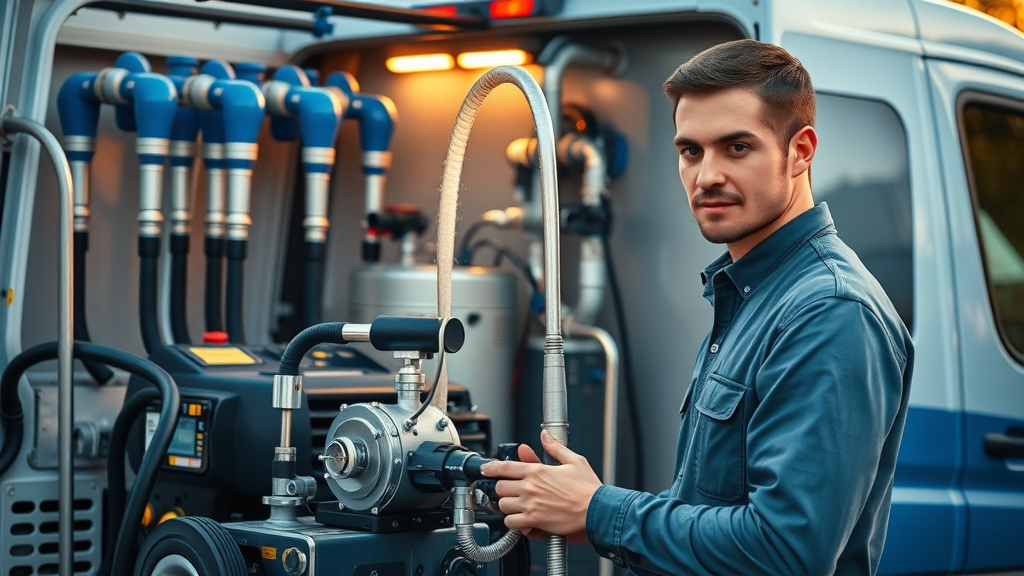
Professional Soft Washing Equipment vs. DIY Approach
Professional soft washing businesses use commercial-grade, specialized equipment designed for maximum safety and efficiency. Such setups include metering systems for accurate chemical mix ratios, dedicated low-pressure pumps, and custom sprayer tips. These professional tools deliver a consistent, optimum clean that's hard to match with consumer-grade pressure washers.
Attempting soft washing as a DIYer is possible, but most home pressure washers don’t include the right accessories or chemical injectors to achieve a professional-level clean. Inexperienced users might risk applying too much solution or pressure, leading to accidental damage. Hiring an accredited professional soft washing company guarantees not just better results but the protection of your home and surrounding environment.
“True soft wash systems use specialized pumps and delivery mechanisms to avoid high-pressure damage.”
Hiring a Professional Soft Washing Service: What to Expect
Why Choose a Professional Soft Washing Company?
Enlisting a professional soft washing service delivers several key benefits. Experienced companies are trained to match the right cleaning solution to each surface, eliminating guesswork and preventing unnecessary damage. They also follow strict safety standards for chemical handling, wear appropriate protective gear, and minimize any risk to your property or landscaping.
Certified and insured providers bring peace of mind, holding themselves accountable for both the quality of the clean and the safety of your home. Many professionals use only eco-friendly, biodegradable cleaning solutions, keeping your family and pets safe. Lastly, established businesses come with a track record of happy customers—always a good sign you’ll get lasting, sparkling, and safe exterior cleaning results.
- Certification and insurance
- Experience with soft washing
- Use of eco-friendly cleaning solutions
- Positive customer reviews
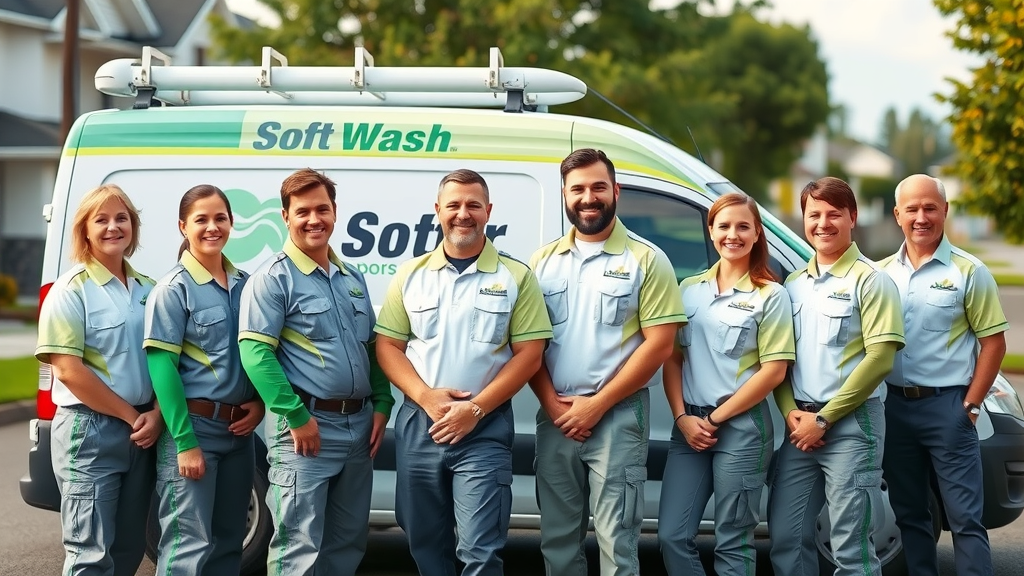
FAQs: What Is Soft Washing and Common Questions
- When should you use soft washing vs. pressure washing? Use soft washing for delicate surfaces like roofs, vinyl siding, painted wood, or when you need to remove organic growth such as algae or mold. Reserve pressure washing for tougher, non-porous surfaces such as concrete, brick, or metal where higher water pressure won't cause harm.
- How long do soft wash results last? The results of a proper soft wash can last anywhere from one to three years, as the cleaning solutions kill mold and algae at the root. Frequency depends on your local climate, surfaces, and level of organic growth, but it generally provides longer-lasting results than pressure washing.
- Are soft wash chemicals safe for pets and plants? When handled correctly and rinsed thoroughly, most modern soft wash chemicals are safe and biodegradable. Professional companies take extra precautions to protect landscaping and pets before, during, and after washing.
- Can you soft wash commercial buildings? Absolutely—soft washing is an excellent method for cleaning commercial properties with signage, awnings, delicate siding, or historic features. It preserves the building’s appearance while adhering to environmental and safety standards.
Key Takeaways: Why What Is Soft Washing Matters
- Soft washing provides a safe, effective alternative to conventional pressure washing
- Ideal for delicate surfaces and environmentally-conscious homeowners
- Professional soft wash services deliver superior, lasting results
Ready to Experience What Is Soft Washing? Get Trusted Results Today
Questions? Call Refreshing Pro Wash today at (541) 636-8094. Call Refreshing Pro Wash at (541) 636-8094 to Learn More.
Soft washing is just one piece of the puzzle when it comes to maintaining your home's beauty and longevity. If you're eager to take your exterior cleaning knowledge further, consider exploring advanced strategies for keeping all your outdoor surfaces—like sidewalks, patios, and driveways—in top condition. Our in-depth resource on sidewalk cleaning best practices offers actionable tips and expert insights that can help you achieve a truly refreshed and inviting property. Dive in to discover how a holistic approach to exterior care can elevate your curb appeal and protect your investment for years to come.
 Add Row
Add Row  Add
Add 

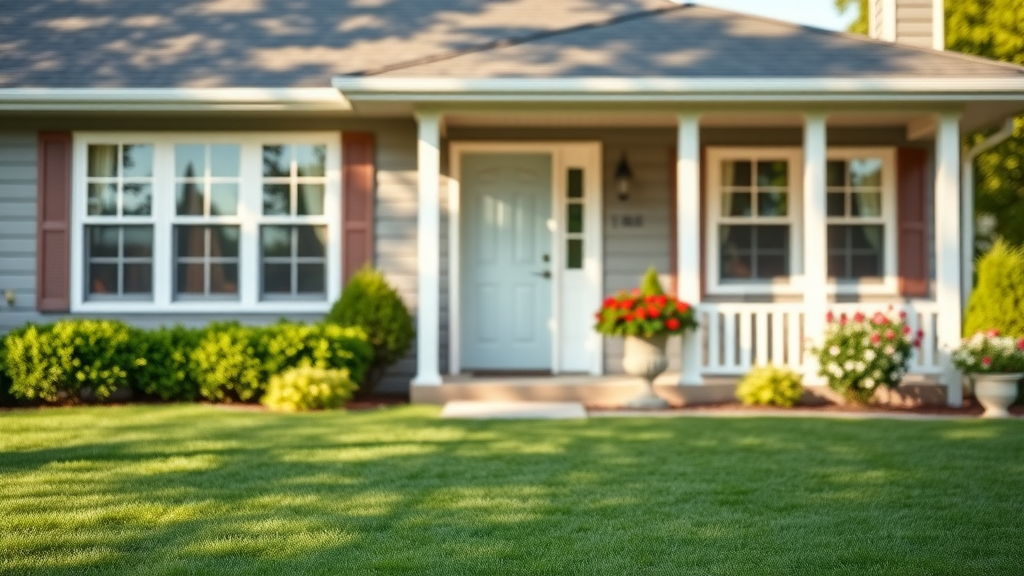
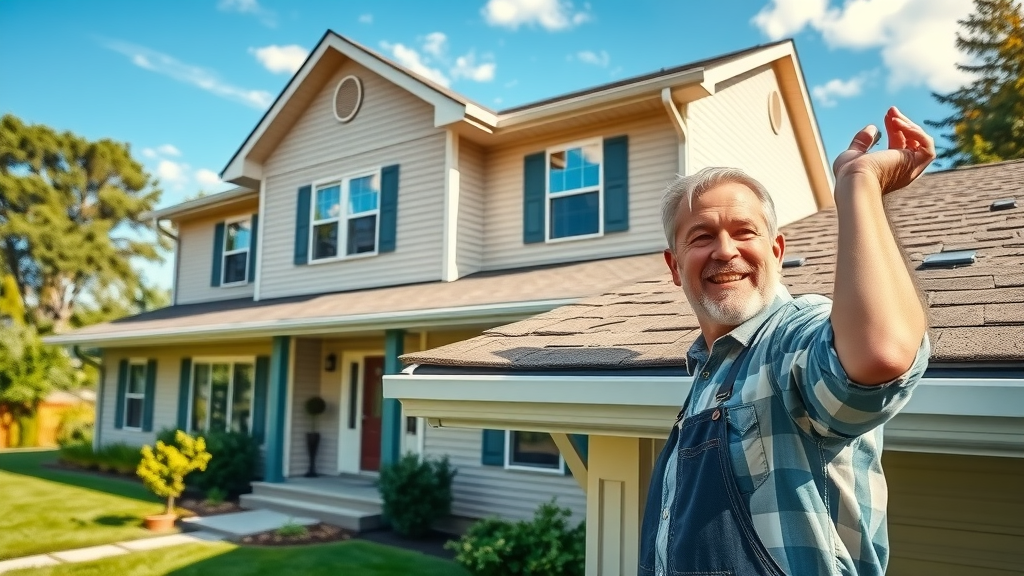


Write A Comment